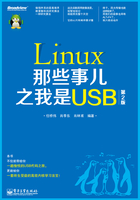
32.驱动的生命线(二)
Core配置设备使用的是message.c里的usb_set_configuration函数。
1430 int usb_set_configuration(struct usb_device *dev, int configuration)
1431 {
1432 int i, ret;
1433 struct usb_host_config *cp = NULL;
1434 struct usb_interface **new_interfaces = NULL;
1435 int n, nintf;
1436
1437 if (configuration == -1)
1438 configuration = 0;
1439 else {
1440 for (i = 0; i < dev->descriptor.bNumConfigurations; i++) {
1441 if (dev->config[i].desc.bConfigurationValue ==
1442 configuration) {
1443 cp = &dev->config[i];
1444 break;
1445 }
1446 }
1447 }
1448 if ((!cp && configuration != 0))
1449 return -EINVAL;
1450
1451 /* The USB spec says configuration 0 means unconfigured.
1452 * But if a device includes a configuration numbered 0,
1453 * we will accept it as a correctly configured state.
1454 * Use -1 if you really want to unconfigure the device.
1455 */
1456 if (cp && configuration == 0)
1457 dev_warn(&dev->dev, "config 0 descriptor??\n");
1458
1459 /* Allocate memory for new interfaces before doing anything else,
1460 * so that if we run out then nothing will have changed. */
1461 n = nintf = 0;
1462 if (cp) {
1463 nintf = cp->desc.bNumInterfaces;
1464 new_interfaces = kmalloc(nintf * sizeof(*new_interfaces),
1465 GFP_KERNEL);
1466 if (!new_interfaces) {
1467 dev_err(&dev->dev, "Out of memory");
1468 return -ENOMEM;
1469 }
1470
1471 for (; n < nintf; ++n) {
1472 new_interfaces[n] = kzalloc(
1473 sizeof(struct usb_interface),
1474 GFP_KERNEL);
1475 if (!new_interfaces[n]) {
1476 dev_err(&dev->dev, "Out of memory");
1477 ret = -ENOMEM;
1478 free_interfaces:
1479 while (--n >= 0)
1480 kfree(new_interfaces[n]);
1481 kfree(new_interfaces);
1482 return ret;
1483 }
1484 }
1485
1486 i = dev->bus_mA - cp->desc.bMaxPower * 2;
1487 if (i < 0)
1488 dev_warn(&dev->dev, "new config #%d exceeds power "
1489 "limit by %dmA\n",
1490 configuration, -i);
1491 }
1492
1493 /* Wake up the device so we can send it the Set-Config request */
1494 ret = usb_autoresume_device(dev);
1495 if (ret)
1496 goto free_interfaces;
1497
1498 /* if it's already configured, clear out old state first.
1499 * getting rid of old interfaces means unbinding their drivers.
1500 */
1501 if (dev->state != USB_STATE_ADDRESS)
1502 usb_disable_device (dev, 1); // Skip ep0
1503
1504 if ((ret = usb_control_ msg(dev, usb_sndctrlpipe(dev, 0),
1505 USB_REQ_SET_CONFIGURATION, 0, configuration, 0,
1506 NULL, 0, USB_CTRL_SET_TIMEOUT)) < 0) {
1507
1508 /* All the old state is gone, so what else can we do?
1509 * The device is probably useless now anyway.
1510 */
1511 cp = NULL;
1512 }
1513
1514 dev->actconfig = cp;
1515 if (!cp) {
1516 usb_set_device_state(dev, USB_STATE_ADDRESS);
1517 usb_autosuspend_device(dev);
1518 goto free_interfaces;
1519 }
1520 usb_set_device_state(dev, USB_STATE_CONFIGURED);
1521
1522 /* Initialize the new interface structures and the
1523 * hc/hcd/usbcore interface/endpoint state.
1524 */
1525 for (i = 0; i < nintf; ++i) {
1526 struct usb_interface_cache *intfc;
1527 struct usb_interface *intf;
1528 struct usb_host_interface *alt;
1529
1530 cp->interface[i] = intf = new_interfaces[i];
1531 intfc = cp->intf_cache[i];
1532 intf->altsetting = intfc->altsetting;
1533 intf->num_altsetting = intfc->num_altsetting;
1534 kref_get(&intfc->ref);
1535
1536 alt = usb_altnum_to_altsetting(intf, 0);
1537
1538 /* No altsetting 0? We'll assume the first altsetting.
1539 * We could use a GetInterface call, but if a device is
1540 * so non-compliant that it doesn't have altsetting 0
1541 * then I wouldn't trust its reply anyway.
1542 */
1543 if (!alt)
1544 alt = &intf->altsetting[0];
1545
1546 intf->cur_altsetting = alt;
1547 usb_enable_interface(dev, intf);
1548 intf->dev.parent = &dev->dev;
1549 intf->dev.driver = NULL;
1550 intf->dev.bus = &usb_bus_type;
1551 intf->dev.type = &usb_if_device_type;
1552 intf->dev.dma_mask = dev->dev.dma_mask;
1553 device_initialize (&intf->dev);
1554 mark_quiesced(intf);
1555 sprintf (&intf->dev.bus_id[0], "%d-%s:%d.%d",
1556 dev->bus->busnum, dev->devpath,
1557 configuration, alt->desc.bInterfaceNumber);
1558 }
1559 kfree(new_interfaces);
1560
1561 if (cp->string == NULL)
1562 cp->string = usb_cache_string(dev, cp->desc.iConfiguration);
1563
1564 /* Now that all the interfaces are set up, register them
1565 * to trigger binding of drivers to interfaces. probe()
1566 * routines may install different altsettings and may
1567 * claim() any interfaces not yet bound. Many class drivers
1568 * need that: CDC, audio, video, etc.
1569 */
1570 for (i = 0; i < nintf; ++i) {
1571 struct usb_interface *intf = cp->interface[i];
1572
1573 dev_dbg (&dev->dev,
1574 "adding %s (config #%d, interface %d)\n",
1575 intf->dev.bus_id, configuration,
1576 intf->cur_altsetting->desc.bInterfaceNumber);
1577 ret = device_add (&intf->dev);
1578 if (ret != 0) {
1579 dev_err(&dev->dev, "device_add(%s) --> %d\n",
1580 intf->dev.bus_id, ret);
1581 continue;
1582 }
1583 usb_create_sysfs_intf_files (intf);
1584 }
1585
1586 usb_autosuspend_device(dev);
1587 return 0;
1588 }
这个函数可以分成三个部分,从1432行到1491行的这几十行是准备阶段,做常规检查,申请内存。1498行到1520行这部分可是重头戏,就是在这里设备从Address发展到了Configured。1522行到1584行这个阶段也挺重要的,主要充实设备的每个接口并提交给设备模型,为它们寻找命中注定的接口驱动,过了这个阶段,usb_generic_driver也就彻底从设备那儿得到满足了,generic_probe的历史使命也就完成了。
先看第一阶段,1437行,configuration是从前面的choose_configuration()那里返回来的值,找到合适的配置,就返回那个配置的bConfigurationValue值,没有找到合适的配置,就返回-1,所以这里的configuration值就可能有两种情况,或者为-1,或者为配置的bConfigurationValue值。
当configuration为-1时,这里为什么又要把它改为0呢?要知道configuration这个值是要在后面的高潮阶段里发送SET_CONFIGURATION请求时用的,关于SET_CONFIGURATION请求,spec里说,这个值必须为0或者与配置描述符的bConfigurationValue一致。如果为0,则设备收到SET_CONFIGURATION请求后,仍然会待在Address状态。这里当configuration为-1也就是没有发现满意的配置时,设备不能进入Configured,所以要把configuration的值改为0,以便满足SET_CONFIGURATION请求的要求。
那接下来的问题就出来了,在没有找到合适配置时直接给configuration这个参数设置为0,也就是让choose_configuration()返回0不就得了,干吗还这么麻烦先返回个-1再把它改成0?有些设备就是有拿0当配置bConfigurationValue值的毛病,你又不能不让它用。想让设备回到Address状态时,usb_set_configuration()就不传递0了,传递一个-1,然后进行处理。如果configuration值为0或大于0的值,就从设备struct usb_device结构体的config数组里将相应配置的描述信息,也就是struct usb_host_config结构体给取出来。
1448行,如果没有拿到配置的内容,configuration值就必须为0了,让设备待在Address那里别动。这也很好理解,配置的内容都找不到了,还配置什么呢?当然,如果拿到了配置的内容,但同时configuration为0,这就是对应了上面说的那种有毛病的设备的情况,就提出警告出现不正常现象了。
1461行,过了这个if函数,第一阶段就告结束了。如果配置是实实在在存在的,就为它使用的接口都准备一个struct usb_interface结构体。new_interfaces是开头儿就定义好的一个struct usb_interface结构体指针数组,数组的每一项都指向了一个struct usb_interface结构体,所以这里申请内存也要分两步走,先申请指针数组的,再申请每一项的。